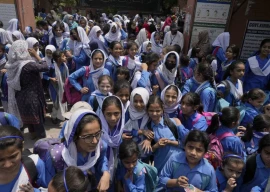Veteran Pashto scholar, poet and writer Layaq Zada Layaq is to receive the prestigious Tamgha-e-Imtiaz for his monumental services to Pashto literature over 39 prolific years.
Born in Maidan, Swat, 55-year-old Layaq is the author of some 30 books of short stories, fictional works, songs, ghazals, research, travelogues, and audio and video dramas, which have acted as a beacon of light for literature students over the years.
Currently working as a station director at Radio Pakistan, Abbottabad, Layaq believes it is his inner attachment to Pukhtun culture that led him to compose such an extensive body of work. While speaking to The Express Tribune, Layaq expressed his gratitude at being awarded the Tamgha-e-Imtiaz.
“A conducive environment for writing and equal opportunities must be provided to the Pukhtuns so their literary potential can be utilised,” said Layaq. “The people of this land are peaceful creatures.”
Layaq’s most recent publication is Bailaly Dao (The Lost Bet), which is a compilation of 120 short stories and is considered the first such effort in the history of Pashto literature. His other collection of short stories is Mata Aina (Broken Mirror), which was published in 2009, while its English version is under publication. Layaq published another collection of fictional work, Shlaydali Taruna (Torn Threads) in 2012.
The scholar’s six poetry books include Gilay (Complaint), Wikh Khobuna (Waking Dreams), Sta Pa Num (In Your Name), Mashkanai (Beads), Lewantob (Madness) and Ta Ba Ma Yadaway (You Will Remember Me). A book of songs, Lewanay Sandaray (Songs of Madness) and one of ghazals, Ma Herawolay Na Shay (You Cannot Forget Me) was also included in his publications. Layaq says he is currently working on a book of Urdu poetry titled, ‘Woh aik shakhs’ and two others in Pashto.
He is also the writer of many famous Pashto songs, such as Gul Jana by Fariha Pervez and Rahim Shah.
The poet is one of the few who has delved deep into the little-explored inner workings of Pukhtun culture and has come out with scathing criticism on inherent flaws in its social fabric.
A famous socio-political poem of Layaq’s was Faraib, which was sung by Fayaz Kheshgi. The words have remained on the lips of every Pukhtun for years and inspire people to stand against feudalism, social injustice and inequality in society.
“Besides a romantic approach to literature, his work also contains stark elements of realism,” writes Hamish Khalil in his book on Pukhtun writers, Pukhtana Lekwal. “Layaq has depicted both the individual and the collective in his writing with eloquent simplicity.”
It can be said that Layaq’s true greatness lies in his tackling of such a wide range of genres and subjects. His 2011 book on Pashto singers of the 20th century, Funkar Na Mri (An Artist Never Dies), is one that has made its place in the literature of the region. The second edition of the book about the history of Pashto music and instruments is currently under publication.
Awami National Party’s parliamentary leader Sardar Hussain Babak extended his congratulations to the writer and praised his services to Pashto literature.
“In contemporary times, Layaq has been our most prolific poet, philosopher and critic,” said Babak. “He has rendered great services to the Pukhtuns and is a precious asset to our nation.”
“With each piece of writing, Layaq continues to push class boundaries in society, and has secured a niche for himself in the world of modern literature,” said Professor Sajjad Ali Khan at Kohat University, while paying glowing tributes to the scholar.
Published in The Express Tribune, August 31st, 2014.



1734609344-0/Untitled-(69)1734609344-0-165x106.webp)
1721739746-0/BeFunky-collage-(12)1721739746-0-165x106.webp)
1734468458-0/Copy-of-Untitled-(50)1734468458-0-270x192.webp)

1734511806-0/Untitled-design-(5)1734511806-0-270x192.webp)









COMMENTS
Comments are moderated and generally will be posted if they are on-topic and not abusive.
For more information, please see our Comments FAQ